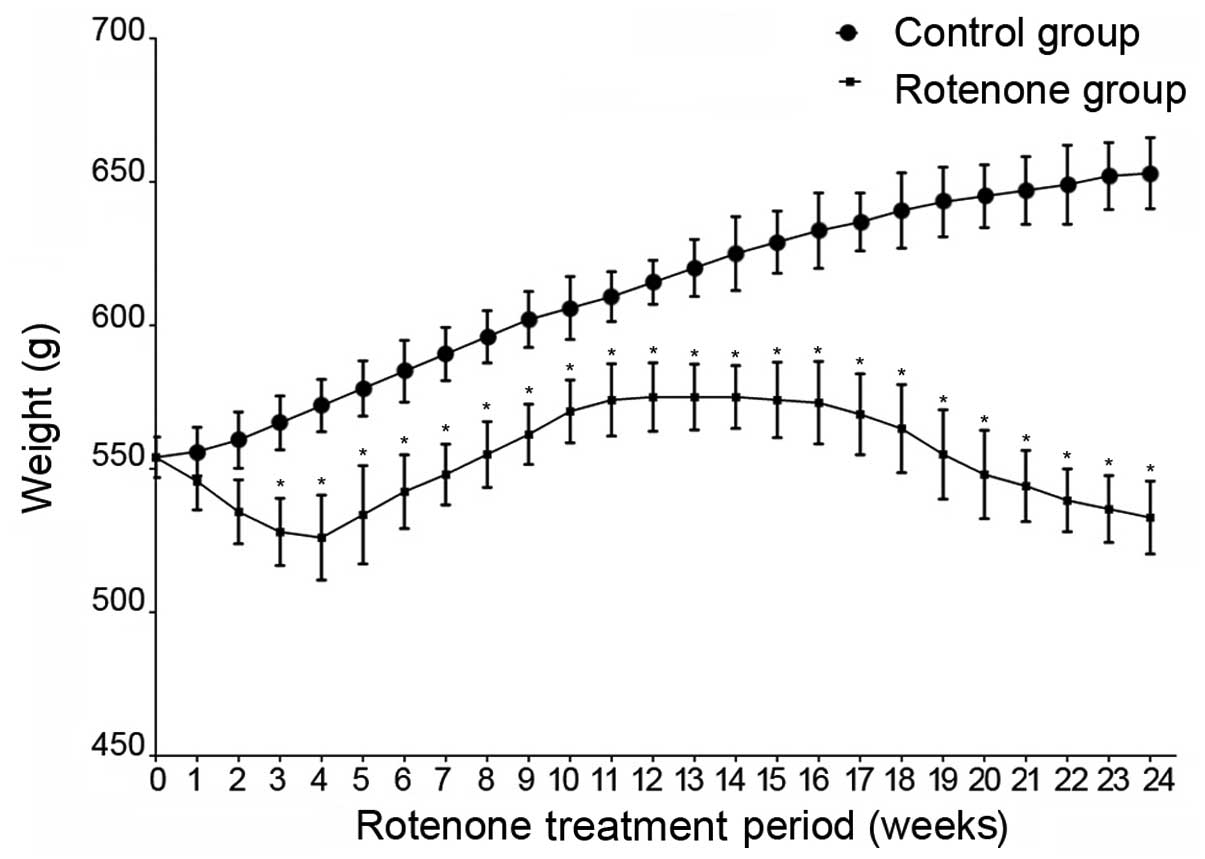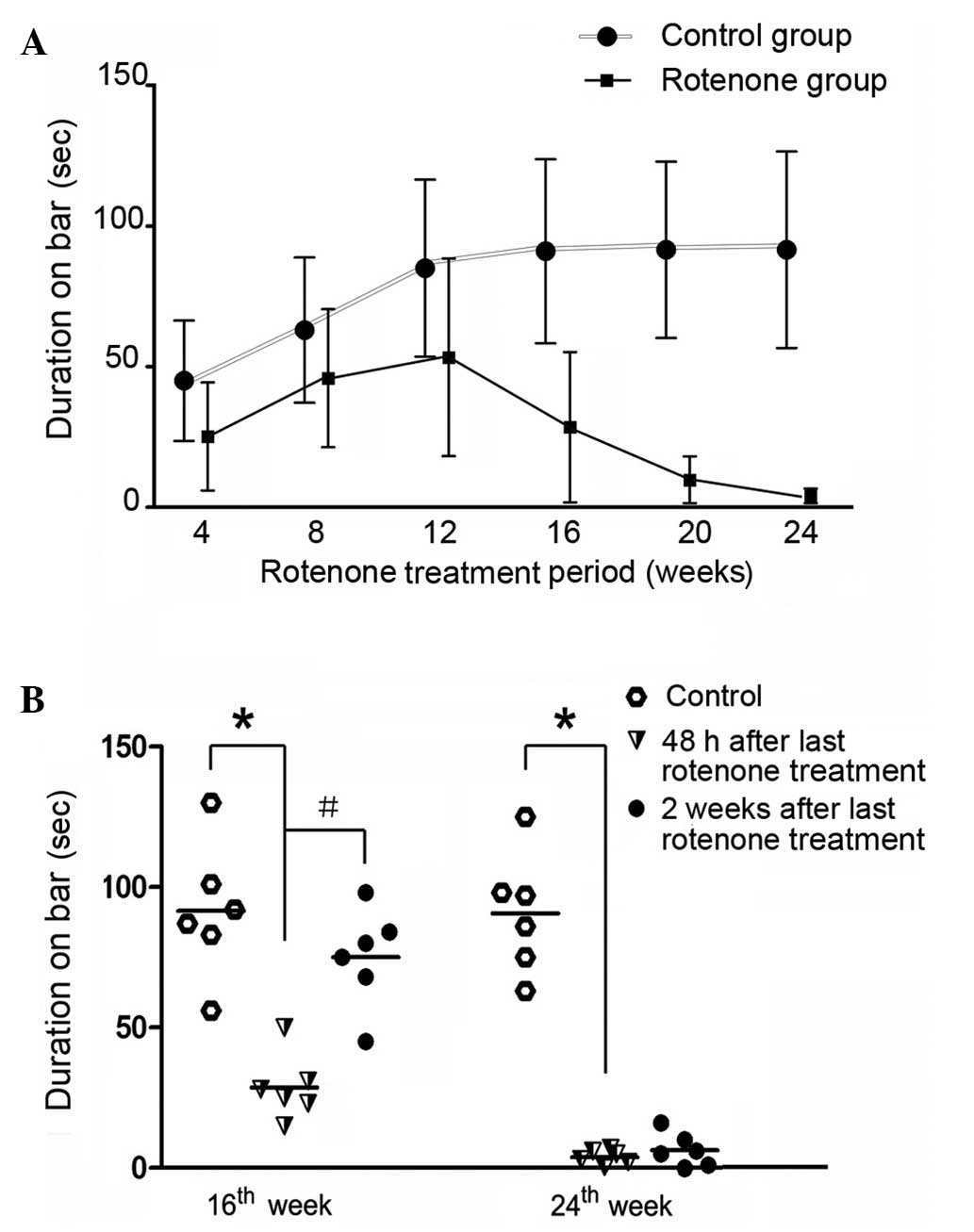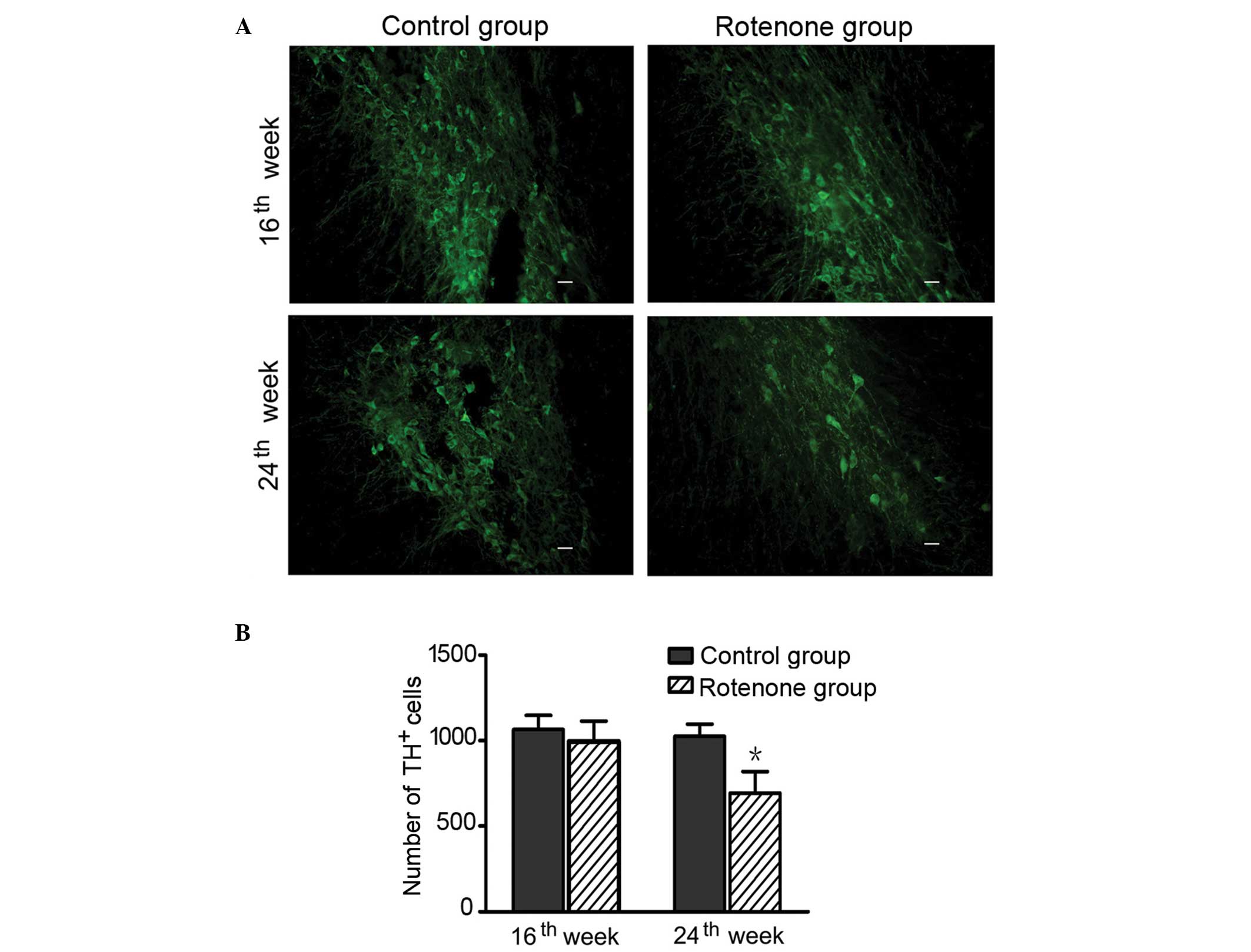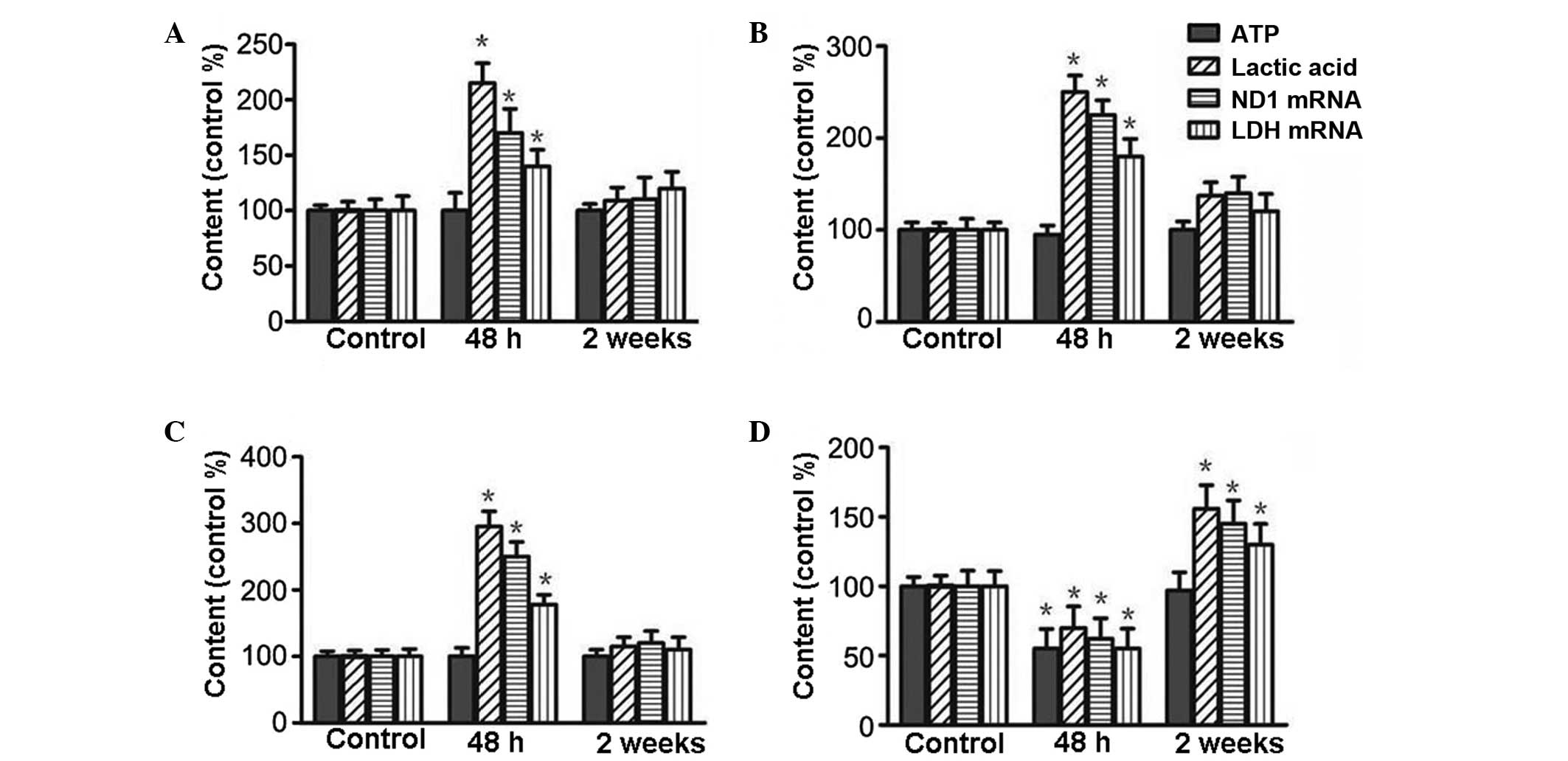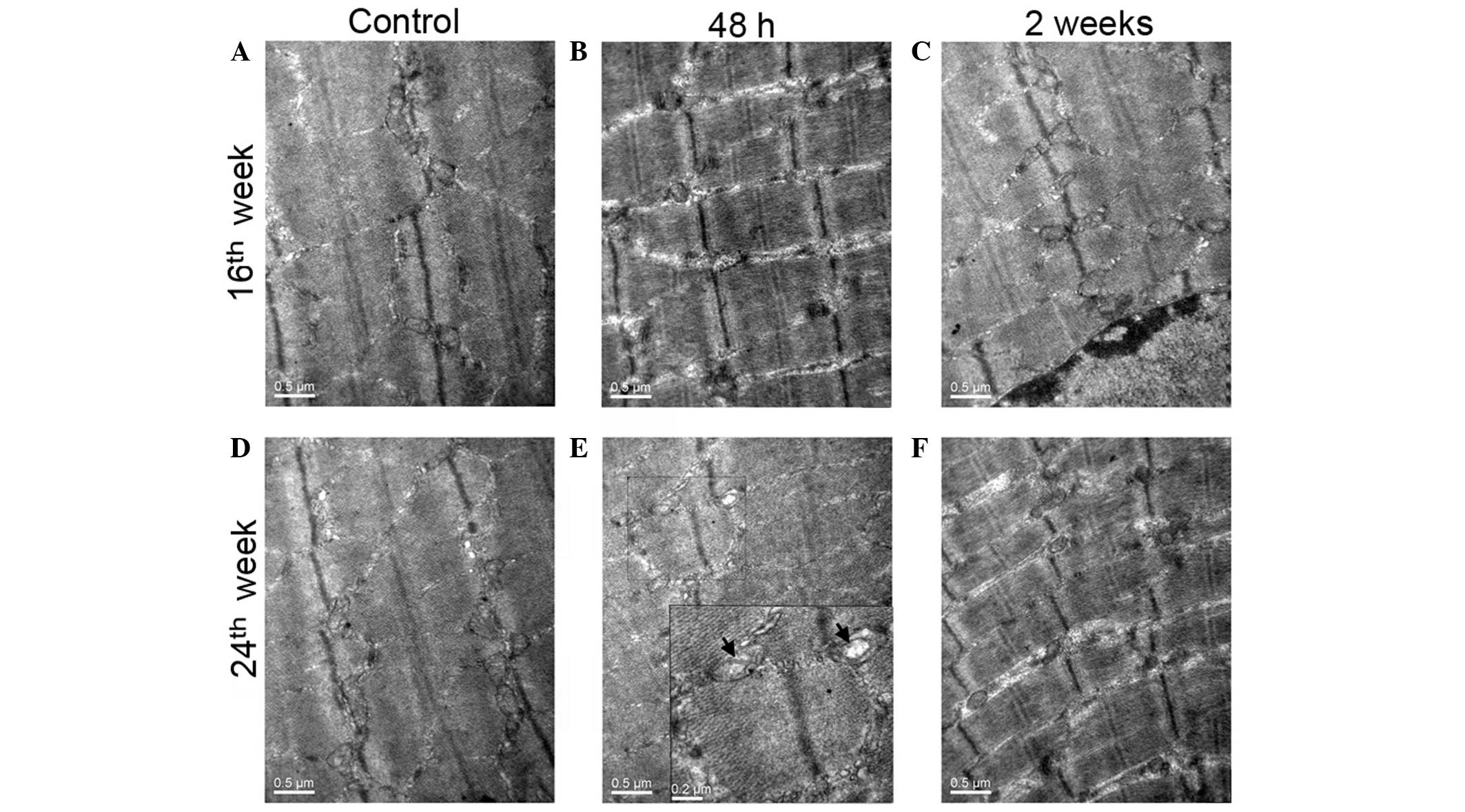|
1
|
Coelho M and Ferreira JJ: Late-stage
Parkinson disease. Nat Rev Neurol. 8:435–442. 2012.PubMed/NCBI
|
|
2
|
Kim YS, Kim YK, Hwang O and Kim DJ:
Pathology of neurodegenerative diseases. InTech. 2012:99–138.
2012.
|
|
3
|
Gorell JM, Peterson EL, Rybicki BA and
Johnson CC: Multiple risk factors for Parkinson's disease. J Neurol
Sci. 217:169–174. 2004. View Article : Google Scholar : PubMed/NCBI
|
|
4
|
Kamel F, Tanner C, Umbach D, Hoppin J,
Alavanja M, Blair A, Comyns K, Goldman S, Korell M and Langston J:
Pesticide exposure and self-reported Parkinson's disease in the
agricultural health study. Am J Epidemiol. 165:364–374. 2007.
View Article : Google Scholar : PubMed/NCBI
|
|
5
|
Dunn L, Allen GF, Mamais A, Ling H, Li A,
Duberley KE, Hargreaves IP, Pope S, Holton JL, Lees A, et al:
Dysregulation of glucose metabolism is an early event in sporadic
Parkinson's disease. Neurobiol Aging. 35:1111–1115. 2014.
View Article : Google Scholar : PubMed/NCBI
|
|
6
|
Schapira AH: Mitochondria in the aetiology
and pathogenesis of Parkinson's disease. Lancet Neurol. 7:97–109.
2008. View Article : Google Scholar : PubMed/NCBI
|
|
7
|
Ambrosi G, Ghezzi C, Sepe S, Milanese C,
Payan-Gomez C, Bombardieri CR, Armentero MT, Zangaglia R, Pacchetti
C, Mastroberardino PG and Blandini F: Bioenergetic and proteolytic
defects in fibroblasts from patients with sporadic Parkinson's
disease. Biochim Biophys Acta. 1842:1385–1394. 2014. View Article : Google Scholar : PubMed/NCBI
|
|
8
|
Bolam JP and Pissadaki EK: Living on the
edge with too many mouths to feed: Why dopamine neurons die. Mov
Disord. 27:1478–1483. 2012. View Article : Google Scholar : PubMed/NCBI
|
|
9
|
Panov A, Dikalov S, Shalbuyeva N, Taylor
G, Sherer T and Greenamyre JT: Rotenone model of Parkinson disease:
Multiple brain mitochondria dysfunctions after short term systemic
rotenone intoxication. J Biol Chem. 280:42026–42035. 2005.
View Article : Google Scholar : PubMed/NCBI
|
|
10
|
Sian J, Dexter DT, Lees AJ, Daniel S, Agid
Y, Javoy-Agid F, Jenner P and Marsden CD: Alterations in
glutathione levels in Parkinson's disease and other
neurodegenerative disorders affecting basal ganglia. Ann Neurol.
36:348–355. 1994. View Article : Google Scholar : PubMed/NCBI
|
|
11
|
Greenamyre JT, Cannon JR, Drolet R and
Mastroberardino PG: Lessons from the rotenone model of Parkinson's
disease. Trends Pharmacol Sci. 31:141–142. 2010. View Article : Google Scholar : PubMed/NCBI
|
|
12
|
Livak KJ and Schmittgen TD: Analysis of
relative gene expression data using real-time quantitative PCR and
the 2−ΔΔCt method. Methods. 25:402–408. 2001. View Article : Google Scholar : PubMed/NCBI
|
|
13
|
Greene JG, Noorian AR and Srinivasan S:
Delayed gastric emptying and enteric nervous system dysfunction in
the rotenone model of Parkinson's disease. Exp Neurol. 218:154–161.
2009. View Article : Google Scholar : PubMed/NCBI
|
|
14
|
Drolet RE, Cannon JR, Montero L and
Greenamyre JT: Chronic rotenone exposure reproduces Parkinson's
disease gastrointestinal neuropathology. Neurobiol Dis. 36:96–102.
2009. View Article : Google Scholar : PubMed/NCBI
|
|
15
|
Cersosimo MG and Benarroch EE:
Pathological correlates of gastrointestinal dysfunction in
Parkinson's disease. Neurobiol Dis. 46:559–564. 2012. View Article : Google Scholar : PubMed/NCBI
|
|
16
|
Abbott RA, Cox M, Markus H and Tomkins A:
Diet, body size and micronutrient status in Parkinson's disease.
Eur J Clin Nutr. 46:879–884. 1992.PubMed/NCBI
|
|
17
|
Cannon JR, Tapias V, Na HM, Honick AS,
Drolet RE and Greenamyre JT: A highly reproducible rotenone model
of Parkinson's disease. Neurobiol Dis. 34:279–290. 2009. View Article : Google Scholar : PubMed/NCBI
|
|
18
|
Greene JG, Dingledine R and Greenamyre JT:
Neuron-selective changes in RNA transcripts related to energy
metabolism in toxic models of parkinsonism in rodents. Neurobiol
Dis. 38:476–481. 2010. View Article : Google Scholar : PubMed/NCBI
|
|
19
|
Crane JD, Abadi A, Hettinga BP, Ogborn DI,
MacNeil LG, Steinberg GR and Tarnopolsky MA: Elevated mitochondrial
oxidative stress impairs metabolic adaptations to exercise in
skeletal muscle. PLoS One. 8:e818792013. View Article : Google Scholar : PubMed/NCBI
|
|
20
|
Desler C, Hansen TL, Frederiksen JB,
Marcker ML, Singh KK and Juel Rasmussen L: Is there a link between
mitochondrial reserve respiratory capacity and aging? J Aging Res.
2012:1925032012. View Article : Google Scholar : PubMed/NCBI
|
|
21
|
Yap LP, Garcia JV, Han D and Cadenas E:
The energy-redox axis in aging and age-related neurodegeneration.
Adv Drug Deliv Rev. 61:1283–1298. 2009. View Article : Google Scholar : PubMed/NCBI
|
|
22
|
Caboni P, Sherer TB, Zhang N, Taylor G, Na
HM, Greenamyre JT and Casida JE: Rotenone, deguelin, their
metabolites, and the rat model of Parkinson's disease. Chem Res
Toxicol. 17:1540–1548. 2004. View Article : Google Scholar : PubMed/NCBI
|
|
23
|
Guarente L, Partridge L and Wallace DC:
Molecular Biology of Aging. Cold Spring Harbor Laboratory Press.
New York, NY: 1–20. 2007.
|
|
24
|
Fern R: Variations in spare electron
transport chain capacity: The answer to an old riddle? J Neurosci
Res. 71:759–762. 2003. View Article : Google Scholar : PubMed/NCBI
|
|
25
|
Blesa J, Phani S, Jackson-Lewis V and
Przedborski S: Classic and new animal models of Parkinson's
disease. J Biomed Biotechnol. 2012:8456182012. View Article : Google Scholar : PubMed/NCBI
|
|
26
|
Lapointe N, St-Hilaire M, Martinoli MG,
Blanchet J, Gould P, Rouillard C and Cicchetti F: Rotenone induces
non-specific central nervous system and systemic toxicity. FASEB J.
18:717–719. 2004.PubMed/NCBI
|
|
27
|
Hilker R, Pilatus U, Eggers C, Hagenah J,
Roggendorf J, Baudrexel S, Klein JC, Neumaier B, Fink GR, Steinmetz
H, et al: The bioenergetic status relates to dopamine neuron loss
in familial PD with PINK1 mutations. PLoS One. 7:e513082012.
View Article : Google Scholar : PubMed/NCBI
|
|
28
|
Jendrach M, Gispert S, Ricciardi F,
Klinkenberg M, Schemm R and Auburger G: The mitochondrial kinase
PINK1, stress response and Parkinson's disease. J Bioenerg
Biomembr. 41:481–486. 2009. View Article : Google Scholar : PubMed/NCBI
|
|
29
|
Morais VA, Haddad D, Craessaerts K, De
Bock PJ, Swerts J, Vilain S, Aerts L, Overbergh L, Grünewald A,
Seibler P, et al: PINK1 loss-of-function mutations affect
mitochondrial complex I activity via NdufA10 ubiquinone uncoupling.
Science. 344:203–207. 2014. View Article : Google Scholar : PubMed/NCBI
|
|
30
|
Hashimoto T, Tokuda T, Hanyu N, Tabata K
and Yanagisawa N: Withdrawal of levodopa and other risk factors for
malignant syndrome in Parkinson's disease. Parkinsonism Relat
Disord. 9(Suppl 1): S25–S30. 2003. View Article : Google Scholar : PubMed/NCBI
|
|
31
|
Pott Godoy MC, Tarelli R, Ferrari CC,
Sarchi MI and Pitossi FJ: Central and systemic IL-1 exacerbates
neurodegeneration and motor symptoms in a model of Parkinson's
disease. Brain. 131:1880–1894. 2008. View Article : Google Scholar : PubMed/NCBI
|
|
32
|
Macht M, Brandstetter S and Ellgring H:
Stress affects hedonic responses but not reaching-grasping in
Parkinson's disease. Behav Brain Res. 177:171–174. 2007. View Article : Google Scholar : PubMed/NCBI
|
|
33
|
Snyder AM, Stricker EM and Zigmond MJ:
Stress-induced neurological impairments in an animal model of
Parkinsonism. Ann Neurol. 18:544–551. 1985. View Article : Google Scholar : PubMed/NCBI
|















